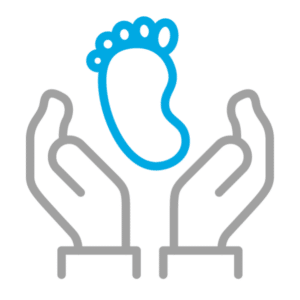

The nurturing role of neonatal nurses
More than 3 million babies are born each year in the US.1 While many are born healthy, some come into the world with a range of issues, including birth defects, prematurity, infections, and heart or surgical problems.2 These tiny patients require careful nurturing, which is readily provided by the heroes of the neonatal intensive care unit (NICU): neonatal nurses.
Making a difference in new lives
Neonatal nurses care for babies shortly after birth; however, comprehensive care extends to these little ones who are sick for months or have long-term issues associated with prematurity or an illness.2,3 Some neonatal nurses may even care for toddlers up to about two years of age, but most care for babies from the time of birth until they can be safely discharged from the hospital.2,3
Neonatal nurses deliver around-the-clock care to critically ill newborns in a number of ways, including3:

Bathing, feeding, and diapering
Administering medications and therapies
Monitoring vital signs
Adjusting the settings on medical equipment

Identifying and notifying the neonatologist of any signs of distress

Providing education and guidance to parents on caring for their babies
Coordinating care plans

Documenting baby’s condition and interventions
“Every parent and patient are different. It’s important to assess what their educational needs are and what the needs are for each baby. First-time parents may need more education around newborn care, feeding, safe sleep, developmental milestones, etc. compared to those who have experience.”
-Taryn M. Edwards, MSN, APRN, NNP-BC
Going beyond the clinical skills
Seeing their baby hooked up to wires, making difficult medical decisions, and not knowing what the future holds are some of the many challenges that parents are faced with in the NICU.3 While neonatal nurses possess the clinical skills needed to care for sick newborns, they also provide emotional support to parents to help them navigate this stressful period in their lives.3
They often lend their support by3:

Engaging in kangaroo care (skin-to-skin contact) to facilitate parent-baby bonding

Educating parents on how they can become involved in their baby’s care

Celebrating milestones

Encouraging hope during trying times

Empathetically listening to parents’ fears and concerns

Connecting families with resources and support groups

Advocating for the needs of the families
Neonatal nurses and parenteral nutrition (PN)
When it comes to pediatric clinical nutrition, neonatal nurses are actively involved. Some newborns have medical conditions that warrant the need for PN to help them grow. Because PN is a complex process,4 neonatal PN services are provided by a specialist multidisciplinary team that consists of a neonatologist or pediatrician, a neonatal dietitian, and a neonatal pharmacist.5 A neonatal nurse is also readily available to support the team in nourishing babies with PN, monitoring clinical outcomes, and providing input for babies with complex needs.5
“Parenteral nutrition is a staple in the NICU and is needed for those infants that are unable to receive full enteral nutrition. For most of our vulnerable infants in the NICU, it is lifesaving.”
-Taryn M. Edwards, MSN, APRN, NNP-BC
Thank you, neonatal nurses
While neonatal nurses are officially recognized and celebrated in September, we appreciate all that they do to nurture brand new lives every day. Their tremendous compassion and unwavering dedication are simply unmatched. Fresenius Kabi thanks each one of them for caring for the tiniest patients.